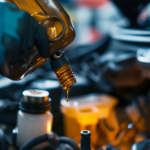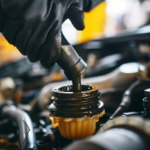Are you wondering how to keep your car’s transmission system running smoothly? Look no further! In this article, we’ll show you the essential steps to maintain your transmission. From checking and changing the fluid to inspecting for leaks and adjusting clutch settings, we’ve got you covered. Plus, we’ll provide tips on monitoring shift points and when to seek professional assistance. Keep reading to ensure your car’s transmission stays in top shape.
Understanding the Transmission System
To properly maintain your car’s transmission system, it is important that you understand how it works. The transmission system in your car is responsible for transferring power from the engine to the wheels, allowing you to control the speed and direction of your vehicle. It consists of several components, including the clutch, gears, and the torque converter. The clutch is responsible for engaging and disengaging power from the engine to the transmission. Gears, on the other hand, allow you to change the speed and torque of your vehicle. Finally, the torque converter helps to maintain smooth power delivery. Understanding how these components work together will help you identify any potential issues and take appropriate maintenance measures.
Checking and Changing the Transmission Fluid
Now it’s time to talk about checking and changing the transmission fluid in your car. Regular maintenance of your transmission fluid is important to ensure the smooth operation of your vehicle. By understanding the signs of fluid problems and knowing whether to tackle the maintenance yourself or seek professional help, you can keep your transmission in top shape.
Importance of Regular Maintenance
Regularly checking and changing the transmission fluid is crucial for maintaining your car’s transmission system. The transmission fluid plays a vital role in lubricating the various components of the transmission, ensuring smooth and efficient gear shifting. Over time, the fluid can become contaminated with dirt, debris, and metal particles, which can lead to increased friction and wear on the transmission parts. By regularly checking the transmission fluid, you can ensure that it is at the proper level and free from any contaminants. Additionally, changing the fluid at the recommended intervals helps to remove any built-up debris and ensures that the transmission is operating at its optimal level. Neglecting to check and change the transmission fluid can result in costly repairs and even transmission failure, so it is essential to make it a part of your regular maintenance routine.
Signs of Fluid Problems
Checking for fluid problems and changing the transmission fluid are essential tasks to ensure the proper functioning of your car’s transmission system. One of the signs of fluid problems is a burning smell coming from the transmission. This could be a sign that the fluid is overheating or that there is a leak. Another sign is if you notice a delay in the shifting of gears or if the gears slip while driving. This could indicate a low fluid level or a problem with the transmission itself. It is important to regularly check the transmission fluid using the dipstick and ensure that it is at the correct level and is clean and clear in color. If the fluid is dirty or has a burnt smell, it may be time to change it. Regularly changing the transmission fluid can help prevent costly repairs and keep your transmission running smoothly.
DIY Vs Professional Maintenance
Are you wondering whether you should perform the task of checking and changing the transmission fluid yourself or seek professional assistance? When it comes to maintaining your car’s transmission system, deciding between DIY and professional maintenance can be a tough decision. Checking and changing the transmission fluid is a crucial part of ensuring the smooth operation of your vehicle. If you have experience and knowledge in car maintenance, performing this task yourself can save you money. However, it’s important to note that changing transmission fluid requires specific tools and expertise. A professional mechanic has the necessary equipment and experience to handle the job correctly. They can also identify any potential issues and provide proper solutions. Ultimately, the decision depends on your comfort level and confidence in performing the task.
Regularly Inspecting the Transmission for Leaks
Make sure you’re keeping an eye out for any leaks in your car’s transmission system. Regularly inspecting your transmission for leaks is essential for maintaining its proper functioning. Leaks can occur due to worn-out seals or gaskets, loose connections, or damaged transmission fluid lines. If left unchecked, these leaks can lead to transmission failure and costly repairs. To inspect for leaks, park your car on a level surface and let it cool down. Use a clean cloth to wipe the transmission and check for any signs of fluid dripping or pooling underneath the car. Be sure to also inspect the transmission pan, cooler lines, and seals for any visible signs of leakage. If you notice any leaks, it’s important to have them addressed promptly by a qualified mechanic to prevent further damage to your transmission.
Properly Maintaining the Transmission Cooling System
To ensure optimal performance, it’s crucial that you regularly maintain your car’s transmission cooling system. The transmission cooling system is responsible for keeping the transmission fluid at the right temperature, preventing it from overheating and causing damage to the transmission. One important step in maintaining the cooling system is to regularly check the transmission cooler for any clogs or leaks. Inspect the cooler for any signs of damage, such as cracks or corrosion, and replace it if necessary. Additionally, it’s important to flush and replace the transmission fluid at recommended intervals to ensure that the cooling system is working efficiently. Be sure to use the proper type of transmission fluid recommended by the manufacturer. By properly maintaining the transmission cooling system, you can extend the lifespan of your transmission and avoid costly repairs.
Monitoring and Adjusting the Transmission’s Band and Clutch Adjustments
How frequently should you check and adjust the transmission’s band and clutch adjustments to ensure smooth operation? It is recommended that you check and adjust the transmission’s band and clutch adjustments every 30,000 to 60,000 miles, or as specified in your car’s owner’s manual. Regularly monitoring and adjusting these components is crucial for maintaining the proper functioning of your car’s transmission system. Over time, the bands and clutches in the transmission can become worn or loose, resulting in poor shifting and potential damage to the transmission. By checking and adjusting these components at regular intervals, you can ensure that the transmission operates smoothly and efficiently. If you notice any signs of slipping gears, delayed engagement, or harsh shifting, it is important to have the band and clutch adjustments inspected and adjusted by a professional mechanic as soon as possible.
Taking Care of the Transmission’s Filter and Pan
When it comes to maintaining your car’s transmission system, it’s important to regularly clean and inspect the filter and pan. The transmission filter plays a crucial role in keeping the transmission fluid clean and free from contaminants. Over time, the filter can become clogged with debris, which can restrict the flow of fluid and lead to transmission problems. To prevent this, you should clean or replace the filter as recommended by your car’s manufacturer. Additionally, it’s essential to inspect the transmission pan for any signs of leakage or damage. The transmission pan holds the transmission fluid and is attached to the bottom of the transmission. If you notice any leaks or cracks, it’s important to address them promptly to avoid further damage to your transmission. Regularly maintaining the filter and pan will help ensure the longevity and smooth operation of your car’s transmission system.
Paying Attention to the Transmission’s Shift Points and Behavior
You need to regularly monitor and evaluate your transmission’s shift points and behavior in order to detect any potential issues early on. Paying attention to how your transmission shifts gears can give you valuable insight into its overall health and performance. When your transmission shifts smoothly and seamlessly, it indicates that everything is functioning as it should. However, if you notice any hesitation, jerking, or clunking noises during shifting, it could be a sign of a problem. Additionally, pay attention to any changes in the transmission’s behavior, such as delayed engagement or slipping gears. These signs can indicate issues with fluid levels, worn-out components, or even electrical problems. By staying vigilant and addressing any concerns promptly, you can prevent major transmission problems and ensure the longevity of your vehicle.
Seeking Professional Help for Transmission Maintenance and Repairs
When it comes to transmission maintenance and repairs, you might be wondering if it’s better to DIY or seek professional help. While DIY may save you some money upfront, it’s important to consider the cost of potential mistakes and the expertise required for proper transmission care. Professional mechanics have the knowledge and experience to diagnose and fix transmission issues efficiently, ensuring the longevity and performance of your car’s transmission system.
DIY Vs. Professional
If you frequently experience issues with your car’s transmission system, it’s advisable to seek professional help for maintenance and repairs. While some car owners may choose to tackle transmission maintenance and repairs themselves, it’s important to consider the benefits of seeking professional assistance. A professional mechanic has the knowledge and expertise to properly diagnose and address any transmission issues your car may have. They have access to specialized tools and equipment that are necessary for proper transmission repairs. Additionally, seeking professional help can save you time and money in the long run. A professional mechanic can quickly identify and fix transmission problems, preventing further damage and costly repairs down the line. So, when it comes to maintaining and repairing your car’s transmission system, it’s best to trust the professionals.
Cost of Repairs
To ensure the proper maintenance and repairs of your car’s transmission system, it’s important to consider the cost of seeking professional help. While it may be tempting to try and save money by attempting DIY repairs, it’s crucial to understand that transmission repairs are complex and require specialized knowledge and tools. Hiring a professional to handle your transmission maintenance and repairs can actually save you money in the long run. Although the cost of professional services may seem high initially, their expertise ensures that the job is done correctly the first time, reducing the risk of further damage and costly repairs down the line. Additionally, professional technicians often have access to better resources and can offer warranties on their work, providing you with peace of mind and protection against unexpected expenses. So, when it comes to your car’s transmission system, investing in professional help is a wise decision.
Importance of Expertise?
Hiring an expert for transmission maintenance and repairs can greatly benefit you in the long run. When it comes to your car’s transmission system, it is important to have someone with the necessary expertise to handle any issues that may arise. A professional understands the intricacies of the transmission system and can accurately diagnose and fix any problems. Attempting to do it yourself or relying on an inexperienced mechanic can lead to costly mistakes and further damage to your vehicle. Professionals have the proper tools and knowledge to ensure that the repairs are done correctly, saving you time, money, and headaches down the road. So, when it comes to your car’s transmission, trust the experts to keep it running smoothly and efficiently.

Lucas is an experienced vehicle technician with hands-on knowledge of almost every car brand available. Throughout his career, Lucas has worked on a wide range of vehicles, including domestic and foreign models, sports cars, trucks, and SUVs.





